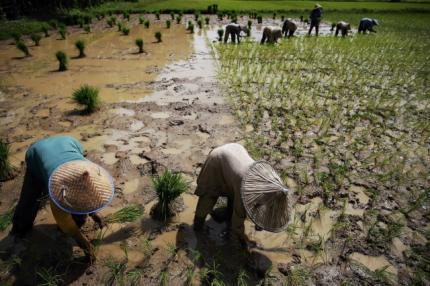Indonesia could double rice imports as election, El Nino loo
Bareksa • 10 Jun 2014

File picture of farmers planting rice at a field near Banda Aceh (REUTERS/Damir Sagolj)
Dry weather late last year and flooding in early 2014 hurt harvests on parts of the main rice-growing island of Java.
Bareksa.com - Indonesia could more than double its rice imports this year to keep domestic food prices stable as an election looms and with a possible El Nino weather pattern on the horizon, industry officials and analysts said.
The outgoing administration of President Susilo Bambang Yudhoyono could set aside its key self-sufficiency targets, importing as much as 1.5 million tonnes of rice to guard against spikes in food prices that could risk social unrest, they said.
Bigger purchases by the world's fifth largest buyer of the grain would be good news for growers that typically supply the country such as Thailand and Vietnam.
Bangkok wants to offload grain from a controversial stockpiling scheme at the heart of its recent political turmoil, while Hanoi is looking to follow up on its successful bid to supply 800,000 tonnes of rice to the Philippines.
"It is likely that Indonesia will indeed import," said David Dawe, senior economist at the U.N.'s Food and Agriculture Organisation in Bangkok.
"My understanding is that there has been a bit of a shortfall in production, or not as much of an increase as they were anticipating."
Dry weather late last year and flooding in early 2014 hurt harvests on parts of the main rice-growing island of Java.
And forecasts that El Nino is likely to develop around mid-year could keep local prices strong. The weather phenomenon usually brings dry conditions to Southeast Asia.
"They definitely don't want prices going up during the election," said Dawe, who met with Indonesian officials in Jakarta last week. He estimated total imports at 1.1 million tonnes in 2014.
With campaigning underway ahead of the presidential election on July 9 and a new government to be inaugurated in October, Yudhoyono will have one eye on his legacy and will not want to risk unrest over food prices, analysts said.
JASMINE, BASMATI
Although the private sector is allowed to import small amounts of specialist rice such as jasmine and basmati, Indonesia's powerful food procurement body Bulog is the dominant rice buyer, tasked with maintaining annual stocks of 1.5-2 million tonnes.
The main rice harvest in the nation of 240 million is usually in June or August, with Bulog typically deciding whether to import from June onwards.
Bulog is yet to ship in any rice this year, CEO Sutarto Alimoeso told Reuters, adding that while it currently had no plans to import, the government was analysing the situation. He said that stocks stood at 1.93 million tonnes.
The agency said it did not import rice at all last year, but some industry sources estimate the nation shipped in up to 700,000 tonnes. Government data is often disputed by market participants in Indonesia.
The U.S. Department of Agriculture predicts Indonesia will import 1.5 million tonnes of rice this year, while an official at the International Rice Research Institute (IRRI) put the figure at 500,000 tonnes.
Rice stockpiles in India, Vietnam and Thailand are big enough to meet the needs of Asian importers until early 2015, according to the IRRI.
Indonesia's government has cut its estimates for unmilled rice output to 73 million tonnes this year, compared to 71.29 million in 2013, but industry sources said this was still an ambitious prediction.
The nation was self-sufficient in rice in the early 1980s, but output gradually declined as farmland was used for housing as the population boomed.
Yudhoyono introduced a number of tough 2014 self-sufficiency targets in 2009 after food prices spiked, but government efforts have been hit by a series of corruption scandals, while expansion plans have often been blocked by red-tape. (Source : Reuters)